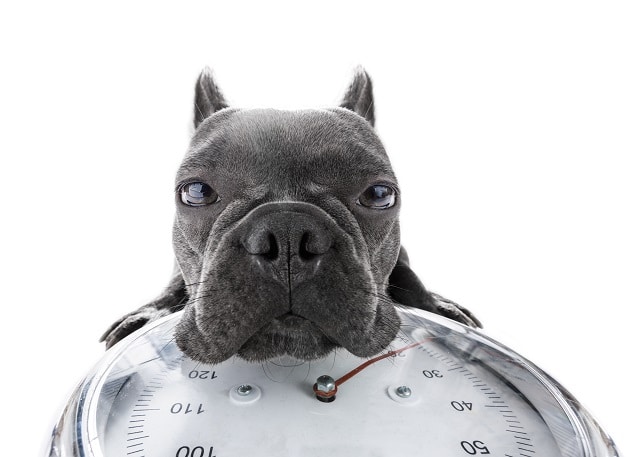To ensure the health and well-being of your French Bulldog, it is necessary to understand that their ideal weight can vary significantly according to their size and gender. Generally speaking, a healthy weight for a male French Bulldog ranges from 20 to 28 pounds, whereas a healthy weight for a female French Bulldog can range from 16 to 24 pounds.
Is my French Bulldog overweight: Having your French Bulldog weighed by your veterinarian is the best way to tell if they are overweight. In that case, your vet can determine if your dog is overweight. Your veterinarian will also examine your Frenchie’s body and compare it to a chart that ranks body types by shape. Scores typically range from one to nine, with one representing underweight and nine extremely overweight. Body composition targets usually fall between four and five.
How Much Should A French Bulldog Weigh?
Use the following calculator to see if your French Bulldog is overweight.
French Bulldog Healthy Weight Chart: Expected Growth For A Puppy (M/F)
| 1 week | 1.2 – 2.2 lbs / 0.5 – 1.0 kg |
| 4 week | 2.0 – 4.2 lbs / 1.0 – 2.0 kg |
| 8 week | 5.0 – 6.9 lbs / 2.2 – 3.0 kg |
| 12 week | 6.9 – 9.0 lbs / 3.0 – 4.0 kg |
| 16 week | 9.0 – 12 lbs / 4.0- 5.4 kg |
| 18 week | 12 – 15 lbs / 5.4 – 6.8 kg |
| 22 week | 15 – 16 lbs / 5.4 – 7.2 kg |
| 26 week | 16 – 18 lbs / 7.2 – 8.1 kg |
| Adult | 23 – 28 lbs / 10 – 12.5 kg |
So how do I know if my French Bulldog is overweight?
In the United States, more than half of all dogs are overweight or obese, according to the Pet Obesity Project. Being an overweight french bulldog puts your dog at a greater risk of arthritis and reduces lifespan. Obesity, however, has been associated with many other conditions in dogs, including cancer, hypertension, and cardiovascular disease.
Your French Bulldog may become overweight French Bulldog because of many factors – such as being overfed, not getting enough exercise, or being ill. It’s important to talk with your veterinarian if you believe your Frenchie could be overweight, mainly if there is rapid weight gain. We’re not always the best judges of our dogs’ weight. For dogs to clean themselves, they must be able to reach all parts of the body.
You should not jump to the conclusion that your French Bulldog is obese. As well as the healthy weight guides above, here is a standard chart of what to look for when assessing your dog’s condition. Using the graphic below, you can see how a dog’s condition should be viewed from different perspectives. It is obvious from this picture that the “Ideal” dog in this photo has a round abdomen just before the legs. Although the ribs are not prominent, there is not much visible fat on the sides. Again, some Frenchies cannot reach those parts of their bodies because of their different body types.
Your Frenchie must look like this as closely as possible.

Reasons That Your French Bulldog Could Be Overweight
After determining that your dog may be overweight or obese, it’s time to look into what could be causing the problem.
| DIET |
|---|
| Although it may seem obvious, what you feed your French Bulldog and the portion size of each meal drastically affect its weight. A study has shown that dogs eating kibble are 1.2 times more likely to be obese than those eating a new diet. Furthermore, a few small meals throughout the day can help maintain a healthy weight, and more than one large meal per day. However, as long as treats represent less than 10% of an individual’s total caloric intake, they do not necessarily increase the risk of obesity. |
| AGE |
|---|
| Frenchies from 6 to 10 years of age have the highest risk of becoming fat french bulldog or obese, but this declines as they age. |
| MOOD |
|---|
| There was a four times greater likelihood that depressed French Bulldogs would be obese than happy French Bulldogs. Depression in dogs can show itself by becoming inactive and withdrawn and changing their eating and sleeping habits. |
| INACTIVITY |
|---|
| Low activity levels can lead to your Frenchie becoming a fat french bulldog or obese like humans. Dogs who exercise less than four hours a week are six times more likely to be obese than dogs who exercise over seven hours a week. |
| OVERALL HEALTH |
|---|
| It is possible that an existing condition could affect your French Bulldog’s weight. For example, a joint injury could deter them from exercising, or thyroid disease or metabolic disorder could result in being underweight or obese. It is also important to talk to your veterinarian about your Frenchies ideal weight, whether there is, in fact, a weight issue, and if an underlying health problem could be to blame. |

How can I get my French Bulldog to lose weight?
To treat obesity in dogs, weight loss must be achieved, followed by a lifetime commitment to maintaining a healthy weight. Weight loss occurs when caloric intake decreases and exercise increases, like in humans. As protein and fiber stimulate metabolism and increase satiety, foods high in protein and low in fat promote weight loss. During your veterinarian’s visit, they will recommend portion size, feeding times, treatment frequency, and appropriate foods. Limiting treats and table scraps is important. It is good to feed green beans and other vegetables instead of treats.
Exercise is just as important as diet to reach and maintain a healthy body weight. You can get canned and kibble dog foods formulated for weight loss and maintenance from commercial and prescription sources. It is not recommended to eat homemade diets because they often fall short of daily vitamin and mineral requirements.
You can walk your dog on a leash for thirty minutes daily (you can do this in ten-minute intervals), play outdoor games, train on a treadmill, or swim. Dog daycares can provide exercise and playtime for your pet two to three times a week.
Most pet stores sell bowls that require your dog to work for each piece of food if it eats too fast. Treat balls that dispense treats only when your dog rolls them around are another good tool. To avoid upsetting the digestive system, dietary changes must be made gradually. After purchasing a new food, feed half the newly purchased food with half the old food for seven days unless your veterinarian advises otherwise. Once this period is over, you may feed the food exclusively.
Weighting pets is free at most veterinary clinics, and no appointment is needed. During the first month of a weight management program, your French Bulldog’s body weight should be checked to ensure the program works. As weight changes, exercise and diet protocol adjustments may need to be made.
You should follow the weight management protocol carefully to prevent your French Bulldog from gaining weight. Ensure that dietary changes are explained to family and friends to prevent your Frenchie from consuming table scraps. Once your Frenchie has reached a healthy weight, a maintenance diet and exercise schedule should be followed for the rest of their life.

Conclusion
Suppose their eating habits are not checked or maintained properly. In that case, French Bulldogs are prone to rapidly gaining weight if they are not properly fed. To extend your French Bulldog’sBulldog’s lifespan, it is essential to maintain the weight of your French BulldogBulldog at a healthy level.
Diet and exercise are the keys to losing weight, whether in a human or your French Bulldog. You will not take long to accomplish your Frenchies’ weight loss goals as long as you are persistent. The most effective way to find out if your Frenchie has any other health issues or if you aren’t seeing much improvement in their diet is to consult your veterinarian.

